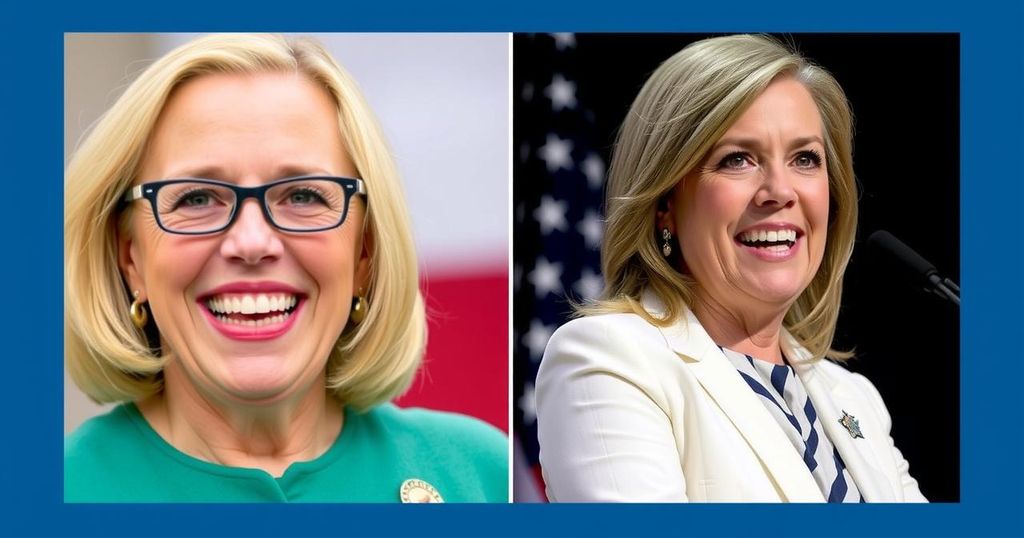Spanberger and Earle-Sears in Tight Race for Virginia Governorship: Poll Findings

Poll results from Emerson College reveal a tightly-contested Virginia gubernatorial race, with Abigail Spanberger leading Winsome Earle-Sears by a slight margin. Economic concerns dominate voter sentiment, with many feeling their financial situation has worsened over the last four years. Demographic analysis shows significant divides in voter support for each candidate. Both candidates remain relatively unknown to voters as electoral campaigning intensifies ahead of the 2025 election.
In a closely monitored poll conducted by Emerson College, Democratic former U.S. Representative Abigail Spanberger and Republican Lieutenant Governor Winsome Earle-Sears are locked in a fiercely competitive race for the governorship of Virginia, with Spanberger holding a slender lead of 42% to Earle-Sears’ 41%. This survey reveals that as the 2025 gubernatorial election approaches, 4% of surveyed voters favor other candidates and 13% remain undecided. Significant demographic variations are evident, highlighting the distinct bases of support for each candidate.
Earle-Sears garners substantial backing from male voters, leading 52% to 37%, and maintains a 50% to 35% advantage among white voters. Conversely, Spanberger secures a significant lead among women, with 47% supporting her compared to Earle-Sears’ 31%. Additionally, Spanberger prevails among older voters aged over 70 and younger voters under 30. With endorsements from key figures such as Governor Glenn Youngkin, Earle-Sears appears well-positioned for the Republican nomination, while Spanberger currently represents the Democratic side.
Future competition remains alive, as the potential entry of U.S. Representative Bobby Scott could expand the Democratic field, while former Republican Representative Denver Riggleman is contemplating a run as an independent candidate. The Emerson poll aligns with prior findings from the University of Mary Washington, illustrating continued voter dissatisfaction with the economy as a dominant issue influencing electoral decisions.
Around 51% of respondents indicated that their financial circumstances have worsened over the past four years, a sentiment that may significantly impact the candidates’ standings as voters look toward the election. Importantly, despite concerns regarding personal economic challenges, 66% of those dissatisfied with their circumstances assign blame to President Biden, with a notable percentage still reporting satisfaction with the state’s leadership under the term-limited Governor Youngkin. Currently, Spanberger has a 38% favorable rating while Earle-Sears has 33%, suggesting voters remain relatively unfamiliar with both candidates. Approaching the election, economic concerns, housing affordability, and healthcare remain pivotal to voters, with the labor market and climate change also remaining relevant discussion points.
As the 2025 gubernatorial election approaches in Virginia, political dynamics are taking shape between two prominent candidates: Abigail Spanberger, a former Democratic U.S. representative, and Winsome Earle-Sears, the Republican Lieutenant Governor. Recent polling demonstrates a highly competitive atmosphere, underscoring key demographic preferences that could dictate the outcome. Voter concerns largely center around economic issues, as dissatisfaction with financial improvement over the past few years has become a critical factor. This context reveals an electorate willing to evaluate candidates based on their responsiveness to current state issues, while emerging candidates within both parties may further complicate the race as the election date approaches.
The tight race between Abigail Spanberger and Winsome Earle-Sears for the Virginia governorship underscores critical voter concerns with the economy, as demographic cleavages influence the campaign trajectory. Spanberger’s slight advantage in voter support highlights her strength among women and young voters, while Earle-Sears shows notable appeal to male and white voters. With heightened economic dissatisfaction dampening voter sentiment, how these candidates address these issues will likely shape the electoral outcome leading up to the 2025 election.
Original Source: virginiamercury.com






